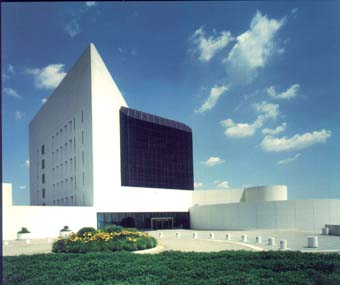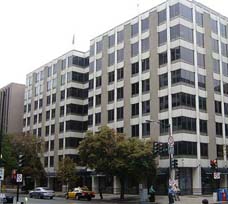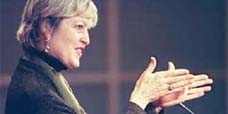2007.07.27: July 27, 2007: Headlines: Presidents - Kennedy: Libraries: Freedom of Information: Speaking Out: Providence Journal Bulletin: The Kennedy Library's expansion will be paid for with federal funds. But there is a question as to how public access to the new papers will be determined
Peace Corps Online:
Peace Corps News:
Peace Corps Library:
Presidents:
President John F. Kennedy:
January 23, 2005: Index: PCOL Exclusive: President Kennedy :
2006.06.07: June 7, 2006: Headlines: Presidents - Kennedy: Libraries: Museuems: Directors - Shriver: The Boston Globe: Kennedy Library sets plan to grow :
2007.07.27: July 27, 2007: Headlines: Presidents - Kennedy: Libraries: Freedom of Information: Speaking Out: Providence Journal Bulletin: The Kennedy Library's expansion will be paid for with federal funds. But there is a question as to how public access to the new papers will be determined
The Kennedy Library's expansion will be paid for with federal funds. But there is a question as to how public access to the new papers will be determined

Will the John F. Kennedy Library, a federal agency, decide who may see the papers? Or will it be the John F. Kennedy Library Foundation, a private entity heavily influenced by the Kennedys but, through its tax exemption, heavily subsidized by the taxpayers? This question arises because some in the past have said that they've been denied access to certain of John Kennedy's officially declassified papers -- presumably, in an attempt by the foundation to protect the late president's image. British historian Nigel Hamilton, who had planned to write a trilogy on the life of JFK, quit after publishing one volume because of what he called persistent stonewalling.
The Kennedy Library's expansion will be paid for with federal funds. But there is a question as to how public access to the new papers will be determined
EDITORIAL - History and hagiography
Jul 27, 2006
Providence Journal Bulletin
The John F. Kennedy Library, in Boston, has announced plans for a new $22 million wing, which will house the papers of members of the Kennedy family, including Edward Kennedy, the late Robert Kennedy, Eunice Kennedy Shriver, her husband Sargent Shriver, Jean Kennedy Smith, and the late Stephen Smith. This expansion is good for Boston and good for Dorchester, the neighborhood where the library, which opened in 1979, is situated.
Yet with friends of President Bush hoping to raise $200 million for a George W. Bush presidential library, it is timely to reflect on who controls the increasing number of public archives created under the Presidential Libraries Act, of 1955.
The Kennedy Library's expansion will be paid for with federal funds. But there is a question as to how public access to the new papers will be determined: Will the John F. Kennedy Library, a federal agency, decide who may see the papers? Or will it be the John F. Kennedy Library Foundation, a private entity heavily influenced by the Kennedys but, through its tax exemption, heavily subsidized by the taxpayers?
This question arises because some in the past have said that they've been denied access to certain of John Kennedy's officially declassified papers -- presumably, in an attempt by the foundation to protect the late president's image. British historian Nigel Hamilton, who had planned to write a trilogy on the life of JFK, quit after publishing one volume because of what he called persistent stonewalling.
Mr. Hamilton's effort, JFK: Reckless Youth (1992), was in many ways an admiring work. But it described the president's well-known and not-so-well-known love affairs, along with other potentially embarrassing aspects of his personal life. These descriptions are apparently what made the author persona non grata at the JFK Library.
Some years later, the library granted Boston University historian Robert Dallek unprecedented -- though still incomplete -- access to Kennedy's medical records, for An Unfinished Life: John F. Kennedy, 1917-1963 (2003). Perhaps the library had learned from Nigel Hamilton's complaints; maybe it simply deemed Mr. Dallek a "friendlier" biographer.
A federal institution with custody of presidential papers should not withhold materials either because of the presidential family's feelings or to promote the president's image. The institution should follow the law, and leave the judgment to history.
A clarification of the John F. Kennedy Library's policy is particularly needed with the addition of papers from Kennedy relatives. For example, will the public have access to the papers of Jean Kennedy Smith in her capacity as ambassador to Ireland but not to those related to her son's 1991 trial for rape (he was acquitted)?
Regarding non-presidential papers, the donors may have some restrictive rights. Still, the publicly funded JFK Library has a responsibility to the public to clarify the terms of acceptance.
And in any event, the withholding from the public of declassified presidential documents is a scandal. It is also a probable violation of the Presidential Libraries Act.
When this story was posted in July 2006, this was on the front page of PCOL:





Peace Corps Online The Independent News Forum serving Returned Peace Corps Volunteers
 | Changing the Face of Hunger
In his new book, Former Congressman Tony Hall (RPCV Thailand) says humanitarian aid is the most potent weapon the United States can deploy against terrorism. An evangelical Christian, he is a big believer in faith-based organizations in the fight against hunger. Members of Congress have recently recommended that Hall be appointed special envoy to Sudan to focus on ending the genocide in Darfur. |
 | PC will not return to East Timor in 2006
Volunteers serving in East Timor have safely left the country as a result of the recent civil unrest and government instability. Latest: The Peace Corps has informed us that at this time, the Peace Corps has no plans to re-enter the country in 2006. The Peace Corps recently sent a letter offering eligible volunteers the opportunity to reinstate their service in another country. |
 | Chris Dodd considers run for the White House
Senator Chris Dodd plans to spend the next six to eight months raising money and reaching out to Democrats around the country to gauge his viability as a candidate. Just how far Dodd can go depends largely on his ability to reach Democrats looking for an alternative to Hillary Clinton. PCOL Comment: Dodd served as a Volunteer in the Dominican Republic and has been one of the strongest supporters of the Peace Corps in Congress. |
 | Vasquez testifies before Senate Committee
Director Vasquez testifies before the Senate Foreign Relations Committee on his nomination as the new Representative to the United Nations Agencies for Food and Agriculture replacing Tony Hall. He has been the third longest serving Peace Corps Director after Loret Ruppe Miller and Sargent Shriver. PCOL Comment: Read our thanks to Director Vasquez for his service to the Peace Corps. |
 | Interview with a Hit Man
RPCV John Perkins says that for many years he was an "economic hit man" in the world of international finance whose primary job was to convince less developed countries to accept multibillion dollar loans for infrastructure projects that left the recipient countries wallowing in debt and highly vulnerable to outside political and commercial interests. In this exclusive interview for "Peace Corps Online," Colombia RPCV Joanne Roll, author of Remember with Honor, talks to Perkins about his Peace Corps service, his relation with the NSA, "colonization" in Ecuador, the consequences of his work, why he decided to speak out, and what his hopes are for change. |
 | Peace Corps stonewalls on FOIA request
The Ashland Daily Tidings reports that Peace Corps has blocked their request for information on the Volkart case. "After the Tidings requested information pertaining to why Volkart was denied the position — on March 2 — the newspaper received a letter from the Peace Corps FOIA officer stating the requested information was protected under an exemption of the act." The Dayton Daily News had similar problems with FOIA requests for their award winning series on Volunteer Safety and Security. |
 | PCOL readership increases 100%
Monthly readership on "Peace Corps Online" has increased in the past twelve months to 350,000 visitors - over eleven thousand every day - a 100% increase since this time last year. Thanks again, RPCVs and Friends of the Peace Corps, for making PCOL your source of information for the Peace Corps community. And thanks for supporting the Peace Corps Library and History of the Peace Corps. Stay tuned, the best is yet to come. |
 | History of the Peace Corps
PCOL is proud to announce that Phase One of the "History of the Peace Corps" is now available online. This installment includes over 5,000 pages of primary source documents from the archives of the Peace Corps including every issue of "Peace Corps News," "Peace Corps Times," "Peace Corps Volunteer," "Action Update," and every annual report of the Peace Corps to Congress since 1961. "Ask Not" is an ongoing project. Read how you can help. |
 | RPCV admits to abuse while in Peace Corps
Timothy Ronald Obert has pleaded guilty to sexually abusing a minor in Costa Rica while serving there as a Peace Corps volunteer. "The Peace Corps has a zero tolerance policy for misconduct that violates the law or standards of conduct established by the Peace Corps," said Peace Corps Director Gaddi H. Vasquez. Could inadequate screening have been partly to blame? Mr. Obert's resume, which he had submitted to the Peace Corps in support of his application to become a Peace Corps Volunteer, showed that he had repeatedly sought and obtained positions working with underprivileged children. Read what RPCVs have to say about this case. |
 | Why blurring the lines puts PCVs in danger
When the National Call to Service legislation was amended to include Peace Corps in December of 2002, this country had not yet invaded Iraq and was not in prolonged military engagement in the Middle East, as it is now. Read the story of how one volunteer spent three years in captivity from 1976 to 1980 as the hostage of a insurrection group in Colombia in Joanne Marie Roll's op-ed on why this legislation may put soldier/PCVs in the same kind of danger. Latest: Read the ongoing dialog on the subject. |
Read the stories and leave your comments.

Some postings on Peace Corps Online are provided to the individual members of this group without permission of the copyright owner for the non-profit purposes of criticism, comment, education, scholarship, and research under the "Fair Use" provisions of U.S. Government copyright laws and they may not be distributed further without permission of the copyright owner. Peace Corps Online does not vouch for the accuracy of the content of the postings, which is the sole responsibility of the copyright holder.
Story Source: Providence Journal Bulletin
This story has been posted in the following forums: : Headlines; Presidents - Kennedy; Libraries; Freedom of Information; Speaking Out
PCOL33822
10

























